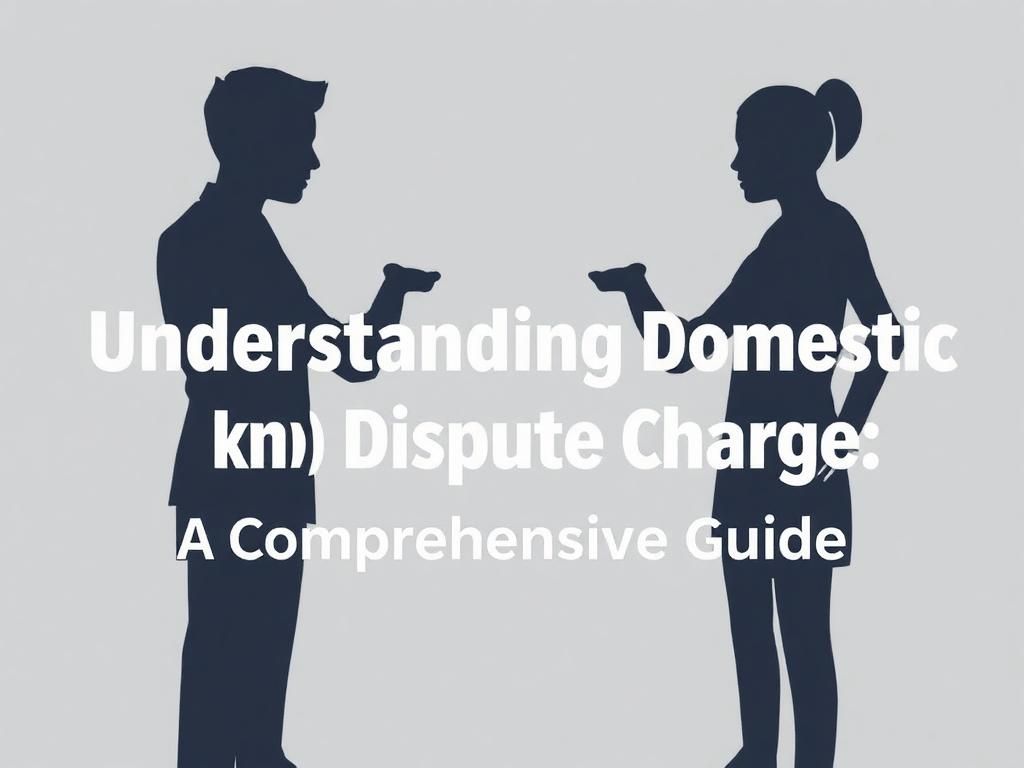Domestic dispute charges refer to allegations of conflict or violence occurring within a household or familial relationship. Understanding these charges is vital for anyone involved, whether directly or indirectly, in a domestic situation. This article provides an in-depth exploration of domestic disputes, including what they entail, their types, legal ramifications, and resources for support. With a structured approach, we’ll break down the complexities surrounding domestic dispute charges and what individuals can do when faced with them.
What Constitutes a Domestic Dispute?
Definition of Domestic Disputes
A domestic dispute arises from conflicts between individuals who share a close relationship, such as spouses, partners, parents, or even roommates. These disputes can manifest in various forms, including:
- Verbal disputes: Arguments or heated exchanges that may escalate but do not involve physical harm.
- Physical altercations: Incidents where one person inflicts harm on another.
- Emotional conflicts: Manipulative behaviors or psychological abuse.
Legal Definitions and Criteria
Legal definitions of domestic disputes can vary by jurisdiction. Most states have specific laws that outline what constitutes domestic violence or assault within familial settings. For instance, some states may classify domestic disputes under protective laws designed to shield individuals from harm within their homes. Generally, to qualify as a domestic dispute in legal terms, there must be:
- A relationship between the parties involved.
- A demonstration of harmful intent or action.
Common Types of Domestic Dispute Charges
Assault Charges
Assault charges are often the most common legal repercussions of a domestic dispute. These charges can vary significantly based on the severity of the incident.
- Simple Assault: Includes threats or minor physical injuries that do not lead to significant bodily harm.
- Aggravated Assault: Involves serious physical harm, the use of a weapon, or intent to seriously injure another.
Examples of situations leading to assault charges might include a heated argument that results in pushing or slapping, leading to minor injuries.
Domestic Violence Charges
Domestic violence encompasses not only physical harm but also emotional, verbal, and psychological abuse. Legally, it can include intimidation, stalking, and emotional manipulation. Penalties for domestic violence charges can be severe, including:
- Mandatory counseling or rehabilitation programs.
- Fines and potential jail time.
- A permanent criminal record.
Restraining Orders
A restraining order is a legal order that restricts one party from contacting or being near another. The process for obtaining such an order usually involves submitting a petition to local courts, often requiring proof of harassment or violence.
Violating a restraining order can lead to severe penalties, including additional charges or even arrest, highlighting the seriousness of the underlying domestic dispute charge.
Legal Consequences of Domestic Dispute Charges
Criminal Penalties
The legal consequences of domestic dispute charges can be significant and are largely dependent on the severity of the incident and local laws. Potential criminal penalties may include:
- Fines: These can range from minor fines for lesser offenses to substantial penalties for more severe charges.
- Jail time: Depending on the charges, an individual may face incarceration, impacting their life and future opportunities.
- Criminal record: A conviction can create long-lasting effects, including difficulties securing employment or housing.
Civil Consequences
Beyond criminal repercussions, individuals facing domestic dispute charges may encounter civil consequences:
- Civil lawsuits: Victims may choose to pursue legal action, resulting in additional financial liability.
- Custody or visitation impacts: Charges may affect family law matters, leading to lost custody or limited visitation rights for the accused.
The Process Following a Domestic Dispute Charge
Arrest and Charges
The aftermath of a domestic dispute may involve arrest. Typically, police respond to calls and assess the situation. Key criteria for arrest include:
- Probable cause: Evidence suggesting a crime has occurred.
- Domestic relationship: The relationship between the parties influences the severity of the response.
The Role of Law Enforcement
Law enforcement plays a crucial part in domestic dispute situations, utilizing various intervention methods:
- De-escalation tactics: Officers may work to calm situations before escalating them further.
- Documentation: Comprehensive reporting ensures accurate records of incidents.
Court Proceedings
After an arrest, court proceedings begin with an arraignment. During this initial court appearance, charges are read, and bail considerations are made. Individuals should understand the trial process:
- A plea may be entered, and a date for trial is set.
- Evidence is gathered by both the defense and prosecution.
Defending Against Domestic Dispute Charges
Common Defense Strategies
Those facing domestic dispute charges can employ various defense strategies:
- Lack of evidence: Challenging the sufficiency of the prosecution’s evidence.
- Self-defense: Individuals may claim they acted to protect themselves from harm.
Importance of Legal Representation
Hiring an experienced attorney is vital when navigating domestic dispute charges. Benefits of legal representation include:
- Knowledge of the law: An attorney understands the intricacies of domestic law and can guide the defense effectively.
- Protecting rights: A legal professional ensures that the accused’s rights are upheld throughout the process.
Support Systems and Resources
Counseling and Mediation Services
Support systems such as family therapy and mediation play essential roles in resolving conflicts and preventing further disputes. Accessing local programs can provide an opportunity for healing and understanding.
Community Resources
Various community resources exist to support both victims and offenders, including:
- Support groups aimed at emotional healing.
- Legal aid organizations that help navigate domestic dispute charges.
Conclusion
Understanding domestic dispute charges is crucial for anyone involved in or affected by domestic issues. Navigating the legal landscape, seeking appropriate help, and utilizing available resources can make a significant difference. If you or someone you know is in a challenging domestic situation, seeking the necessary legal and emotional support is essential.
Additional Resources
Educational Materials and Websites
For further education and support, consider these resources:
Frequently Asked Questions (FAQs)
- What should I do if I am accused of a domestic dispute charge? It is crucial to seek legal representation immediately to understand your rights and options.
- Can I obtain a restraining order against someone? Yes, if you feel threatened or have been a victim of domestic violence, you may petition for a restraining order.
- What are the signs of domestic violence? Signs include physical injuries, emotional manipulation, isolation, and fear of discussing your partner.
- Are domestic dispute charges civil or criminal? They can be both, depending on the nature of the complaint and the actions taken.
- How can mediation help in a domestic dispute? Mediation allows both parties to discuss their issues with a neutral third party, helping to resolve conflicts peacefully.
- What happens if a restraining order is violated? Violating a restraining order can lead to additional criminal charges and possible arrest.
| Type of Charge | Definition | Potential Penalties |
|---|---|---|
| Assault | Infliction of physical harm or threat of harm | Fines, jail time, criminal record |
| Domestic Violence | Abuse between individuals in close relationships | Mental health programs, fines, jail time |
| Restraining Order | Legal order to prevent contact with another individual | Additional charges, possible arrest |
Understanding domestic dispute charges is essential for navigating the complexities of legal and emotional challenges that arise in these situations. Whether through legal channels or support resources, individuals can find paths to resolution and safety.


